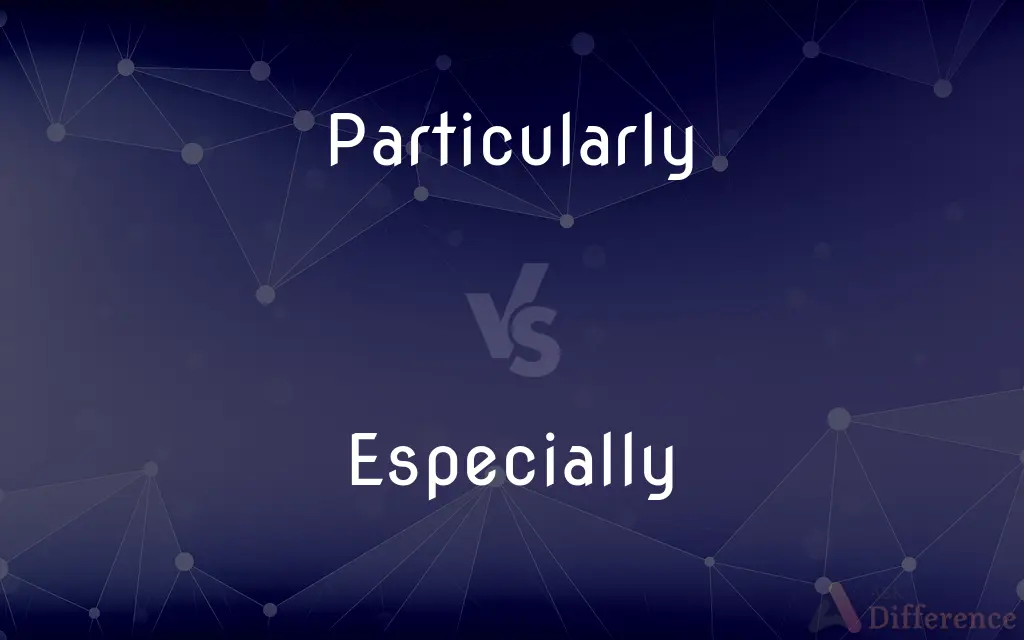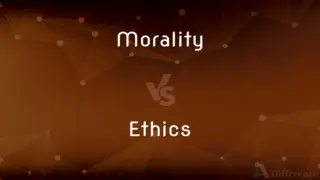Particularly vs. Especially — What's the Difference?
By Tayyaba Rehman & Maham Liaqat — Updated on March 25, 2024
"Particularly" emphasizes a specific detail within a broader context, while "especially" denotes a higher degree of significance or exclusivity among alternatives.

Difference Between Particularly and Especially
Table of Contents
ADVERTISEMENT
Key Differences
"Particularly" is used to highlight a specific element or aspect within a larger set, often to draw attention to a detail that is noteworthy without implying it is the most important. For example, one might appreciate all the features of a smartphone but mention being particularly fond of its camera quality, signifying a specific interest without necessarily ranking it above all other features. In contrast, "especially" is employed to single out one or more elements as being of greater significance or importance compared to others. Using the previous example, saying one is especially fond of the camera quality implies that, among all the appreciated features, the camera stands out as significantly better or more valued.
While "particularly" serves to specify or narrow down a focus within a general observation or statement, "especially" adds a layer of emphasis or priority, suggesting a comparative evaluation where the highlighted element is superior or more important. For instance, a teacher may find all her students talented but regard one as particularly diligent, indicating a specific attribute without comparison, whereas describing a student as especially diligent suggests a comparative excellence in diligence among peers.
The choice between "particularly" and "especially" can subtly change the nuance of a sentence, with "particularly" being more neutral and focused on identification, and "especially" carrying a stronger emphasis on hierarchy or preference. For example, saying "The meal was particularly delicious" focuses on the meal's quality among its many attributes, while "The meal was especially delicious" implies it stood out in comparison to other meals.
In terms of usage, both words can often be used interchangeably without significantly altering the sentence's meaning, especially in informal contexts. However, the slight nuance between specifying detail ("particularly") and emphasizing superiority or significance ("especially") becomes more important in formal writing or when the speaker intends to convey a precise shade of meaning.
Comparison Chart
Purpose
To highlight a detail within a broader context.
To denote significance or priority among alternatives.
ADVERTISEMENT
Emphasis
Specifies or identifies without strong comparative implication.
Implies comparison or a higher degree of importance.
Nuance
Neutral, focusing on the identification of specifics.
Stronger, suggesting superiority or preference.
Example Use
"The garden is beautiful, particularly in the spring."
"The garden is beautiful, especially in the spring."
Interchangeability
Often used interchangeably, but with subtle differences in emphasis.
Preferable when expressing a comparative or superlative degree.
Compare with Definitions
Particularly
Highlighting a specific aspect within a broader set.
He's talented in many areas, particularly music.
Especially
Denotes a higher degree of significance among options.
He's talented in many areas, especially music.
Particularly
Focuses on detailing without strong comparative weight.
The painting was full of interesting elements, particularly the use of light.
Especially
Implies a comparative or superlative degree.
The painting was captivating, especially the use of light.
Particularly
Used to specify or narrow down.
She enjoys outdoor activities, particularly hiking and biking.
Especially
Conveys a hierarchy or preference.
All the dishes were good, especially the vegetarian options.
Particularly
Neutral in terms of preference or hierarchy.
All the dishes were good, particularly the vegetarian options.
Especially
Used to express a strong preference or highlight.
She enjoys outdoor activities, especially hiking.
Particularly
Indicates a special interest or notice in a detail.
The lecture was informative, particularly the section on renewable energy.
Especially
Indicates that something stands out as significant or superior.
The lecture was fascinating, especially the section on renewable energy.
Particularly
To a great degree; especially
I particularly like the brown shoes.
Especially
Used to single out one person or thing over all others
A new song, written especially for Jonathan
He despised them all, especially Sylvester
Particularly
With particular reference or emphasis; individually or specifically
"Everyone has a moment in history which belongs particularly to him" (John Knowles).
Especially
To a great extent; very much
He didn't especially like dancing
Sleep is especially important in growing children
Particularly
With regard to particulars; in detail.
Especially
To an extent or degree deserving of special emphasis; particularly.
Particularly
(focus) Especially, extremely.
The apéritifs were particularly stimulating.
Especially
(manner) In a special manner; specially.
Particularly
(degree) To a great extent.
Especially
(focus) Particularly; to a greater extent than is normal.
Particularly
Specifically, uniquely or individually.
Especially
(focus) Used to place greater emphasis upon someone or something.
Invite them all, especially Molly.
Particularly
In detail; with regard to particulars.
Especially
In an especial manner; chiefly; particularly; peculiarly; in an uncommon degree.
Particularly
(dated) In a particular manner; fussily.
Especially
To a distinctly greater extent or degree than is common;
He was particularly fussy about spelling
A particularly gruesome attack
Under peculiarly tragic circumstances
An especially (or specially) cautious approach to the danger
Particularly
In a particular manner; expressly; with a specific reference or interest; in particular; distinctly.
Especially
In a special manner;
A specially arranged dinner
Particularly
In an especial manner; especially; in a high degree; as, a particularly fortunate man; a particularly bad failure.
The exact propriety of Virgil I particularly regarded as a great part of his character.
Particularly
To a distinctly greater extent or degree than is common;
He was particularly fussy about spelling
A particularly gruesome attack
Under peculiarly tragic circumstances
An especially (or specially) cautious approach to the danger
Particularly
Specifically or especially distinguished from others;
Loves Bach, particularly his partitas
Recommended one book in particular
Trace major population movements for the Pueblo groups in particular
Particularly
Uniquely or characteristically;
These peculiarly cinematic elements
A peculiarly French phenomenon
Everyone has a moment in history which belongs particularly to him
Common Curiosities
Does "especially" always imply a comparison?
"Especially" often carries a comparative weight, suggesting that something is more significant or preferred among alternatives.
Can "particularly" and "especially" be used interchangeably?
While often used interchangeably, "particularly" specifies within a set, and "especially" implies a comparative significance.
Can "especially" be used without implying superiority?
"Especially" typically conveys a degree of emphasis or superiority, though it can be used more neutrally in casual speech.
Is "particularly" used for negative contexts?
"Particularly" can be used neutrally in both positive and negative contexts to specify a detail.
Is one more formal than the other?
Neither word is inherently more formal, but "especially" might be chosen for its stronger emphasis in formal comparisons.
How does "especially" change the emphasis in a statement?
It adds a layer of significance or priority, often suggesting that the highlighted element is of greater importance compared to others.
How does "particularly" modify the meaning of a sentence?
It narrows the focus to a specific detail or aspect within a broader context, without strong emphasis on hierarchy.
Are there contexts where only one of the two words is appropriate?
Yes, depending on whether the intent is to simply specify or to emphasize comparative importance, one may be more appropriate than the other.
How do nuances between "particularly" and "especially" impact persuasive writing?
In persuasive writing, "especially" can be a stronger tool to emphasize points deemed crucial to the argument, whereas "particularly" can detail supporting points.
In instructional content, is one preferable over the other?
In instructional content, "particularly" might be used to focus on specific steps or details, while "especially" could highlight critical points or cautions.
Can these words be used at the beginning of a sentence?
Yes, both can start a sentence when emphasizing a point, e.g., "Especially interesting was the chapter on evolution."
How do "particularly" and "especially" affect the tone of academic writing?
In academic writing, choosing between them can subtly affect the tone by either merely specifying ("particularly") or emphasizing importance ("especially").
How do "particularly" and "especially" interact with adjectives or adverbs in a sentence?
They can modify adjectives or adverbs to either highlight a specific quality ("particularly bright") or underscore its significance ("especially bright").
Does the use of "particularly" in a list imply that the listed item is more important?
Not necessarily; it often serves to highlight a detail within the list without implying it is the most important.
Can "especially" imply exclusivity?
"Especially" can suggest a form of exclusivity or special consideration, depending on the context.
Share Your Discovery

Previous Comparison
Dale vs. Glen
Next Comparison
Morality vs. EthicsAuthor Spotlight
Written by
Tayyaba RehmanTayyaba Rehman is a distinguished writer, currently serving as a primary contributor to askdifference.com. As a researcher in semantics and etymology, Tayyaba's passion for the complexity of languages and their distinctions has found a perfect home on the platform. Tayyaba delves into the intricacies of language, distinguishing between commonly confused words and phrases, thereby providing clarity for readers worldwide.
Co-written by
Maham Liaqat















































